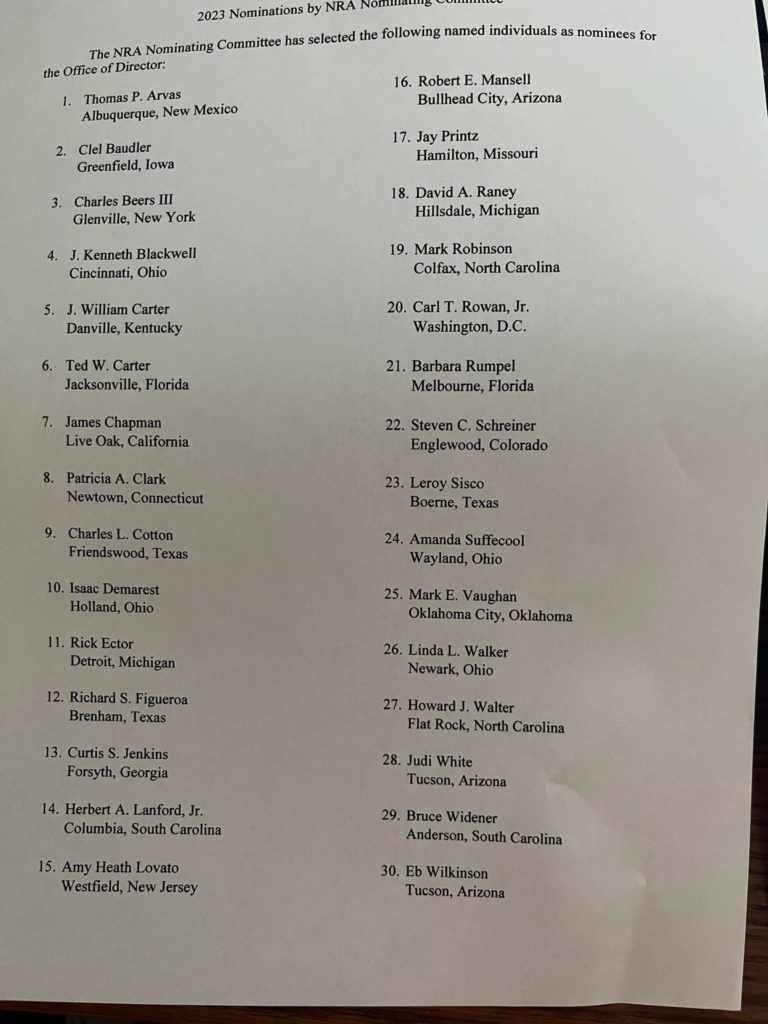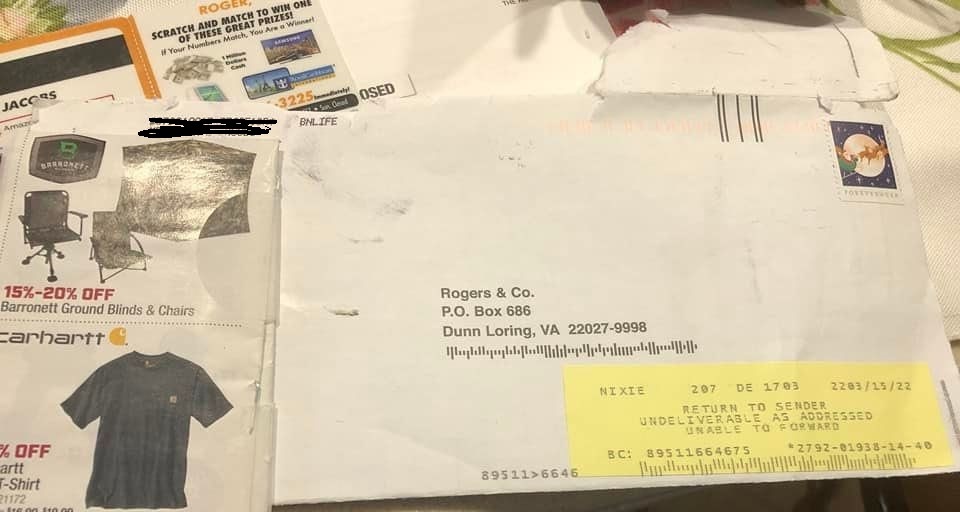Note: I want to emphasize that I did not obtain Frank Tait’s letter from Frank nor any member of the Board of Directors. He also did not give me permission to publish or quote from it. However, he was willing to answer questions about the letter for which I was appreciative.
Frank Tait sent a wake-up letter to the NRA Board of Directors a week ago. It asked for answers to many tough questions especially with regard to the NRA’s finances. Almost immediately, Marion Hammer went into “enemy within” mode and told the rest of the Board to delete the email. She also suggested they block Frank who is a member of the Board. In one of his few instances of showing a spine, NRA Secretary and General Counsel John Frazer had to step in and remind everyone of the existing records retention order.
Frank starts by saying:
Dear Fellow Directors,
I am humbled and honored to serve the members of our great Association. As I come to the end of my brief term on the NRA Board of Directors, there are observations and recommendations to share with the entire board. I attended the January Board meeting and made 4 visits to headquarters requesting and reviewing a wide number of documents to fulfill my obligations as spelled out in the NRA Director Reference Book and in the Right from the Start: Responsibilities of Directors of NOT-FOR-PROFIT Corporations issues by the Office of the New York State Attorney General Charities Bureau. I encourage you to familiarize yourself with the document and encourage you to review underlying documents to what management presents to assure yourselves of the health of our Association.
My overall impression is that Directors willingly serve in the area where they are asked to focus. And that only a select few long-term insiders such as the Executive Council members, focus on the overall financial health of the Association. Directors are ‘kept busy’ with outward facing activities and that Directors assume that “someone else” is handling the overall financial health of the Association. Only the officers, Executive Council members and management have a complete picture of the health and status of the Association. Directors need to recognize that it is THEIR responsibility to look at the overall
financial health of the Association IN ADDITION to their Committee assignments.
Two years ago I wrote a post about fiduciary duty and the responsibilities of the NRA Board of Directors. Every member of the NRA Board as well as the employed officers (CEO, CFO, Secretary, etc) is a fiduciary. As such, under New York law they have three duties that they must fulfill as a fiduciary. They are the duty of care, the duty of loyalty, and duty of obedience. Summarizing these duties, the duty of care means providing reasonable time, attention, and care to providing organization oversight. Loyalty means acting in the best interests of the organization and its members rather than their own self-interests. The duty of obedience means the board is fulfilling its fiduciary responsibility to ensure that the organization is abiding by its stated mission and is complying with all state and federal laws. New York law goes even further to include internal governing documents and policies such as the bylaws.
To assist board members in understanding their fiduciary duty, the New York Charities Bureau publishes a short booklet called “Right from the Start”. Frank referenced that publication in his letter to his fellow board members. Another publication from the Charities Bureau not referenced by Frank deals with internal controls and financial accountability. Both publications make reference to financial reports and the obligation of board members to review them. For example, in Right from the Start, it says one should “Obtain the current year’s budget and cash flow projections. Find out how they compare to actual income and expenses and what processes are in place to monitor these comparisons.” This was suggested to be done even before someone is seated on a board. After becoming a board member, Internal Controls says procedures should be in place “ensuring that timely and appropriate financial reports are distributed to all directors and officers and reviewed by them, as well as the president, chief executive officer, treasurer and chief financial officer.“
Frank points out it is the responsibility of all Directors to look at the overall financial health of the NRA and not just those of a specified committee such as the Finance Committee. He then makes recommendations on records transparency including a suggestion of a way to provide documents to the Board through a secure, electronic site. Since the Special Litigation Committee is a committee of the Board, it should be required to keep minutes and report out its decisions. One need only look to how they handled the abortive bankruptcy filing to see how they failed at providing transparency of their actions to the Board. That is, the Board didn’t know a bankruptcy filing was in the offing until after it was filed.
He then makes recommendations regarding compliance and cybersecurity. With regard to compliance, he says to move forward with appointing a Chief Compliance Officer and to bring that resolution to the members. I agree with Frank that the members would approve this move. Given it is adding an officer to the NRA, it must be approved by a members’ vote. That cannot happen until ballots go out in 2024. Also with regard to compliance, the lines of authority needs to be spelled out in a Delegation of Authority Matrix. Currently, these lines of authority are in various documents some of which have not been provided to the Board.
On cybersecurity, Frank notes the NRA has a significant amount of information on individual members including credit card numbers. He and Judge Phil Journey have submitted a resolution to the Board requesting a Cybersecurity Committee be established. You may remember that Russian hackers hit the NRA with a ransomware attack in the fall of 2021. Frank suggests a full Systems and Operation Control audit be part of the annual audit to keep members’ and employees’ data secure.
I spoke with Frank this afternoon after he attended the Finance Committee meeting. He and Judge Journey will be retracting their proposed resolution on the establishment of a Cybersecurity Committee. He said the NRA has taken some measure to improve cybersecurity including locking out thumb drive access to all computers and watermarking financial documents so that the recipient is known for each copy. They also have all computers emptying “trash” automatically as this was the way the hackers obtained some of their data.
Now to the meat of Frank’s letter – Financial Oversight. This is where Directors need to become involved in order to fulfill their fiduciary duties. Sec. 717 of the New York Consolidated Laws, Non-Profit Corporation Law outlines the duties of officers and directors. The law considers that directors, if acting in good faith, may rely on reports from officers, qualified professionals, and designated committees of the board. However, it is conditioned on officers being “reliable and competent” in the matter presented, the professionals having the professional expertise, and the committee “merits confidence.” It then goes on to say, “Persons shall not be considered to be acting in good faith if they have knowledge concerning the matter in question that would cause such reliance to be unwarranted.” The bottom line is that the Board cannot rely on “well, Wayne assured me” or “Charles and David said it was OK” anymore. That would not be consistent with the care that a ordinarily prudent person would exercise under these circumstances.
Frank continues:
Membership is down as is membership revenues. From 2021 to 2022, new memberships fell by 35%. The budget adopted assumed growth in both members and membership revenue. The actual numbers are going in the opposite direction. When Frank asked for a management response to this, he got a response from John Frazer that just infuriates me. It was arrogant and rude in my opinion.
John Frazer replied “your requests for responses to questions about budget projections and the NRA’s ability to meet its budget, outside the scope of a meeting of the Board, are redundant and therefore unnecessary. The NRA addresses directors’ questions of this type in the appropriate time, place, and manner-i.e., during meetings of its Board and duly appointed committees, rather than through ongoing, ad hoc responses to individual directors between Board meetings.”
With that type of response, is it any wonder that Frazer is a named defendant in the New York Attorney General’s lawsuit?
The balance sheet information above is from the annual reports. As with any balance sheet, it is for a spot in time unlike a cashflow or income statement.
As I noted above, I spoke with Frank after he met with the Finance Committee. He got some answers but not everything. The NRA will be starting a campaign to raise membership and membership revenues. However, they will be using extensive discounting which reduces the revenue impact of the campaign. He said the NRA is working hard to reduce costs by not filling positions and renegotiating contracts.
There is a saying that you cannot shrink yourself to prosperity. The cost cutting measures help but are not enough. Hypothetically, the NRA has a $50 million problem which new programs that generate revenue are the key. It would be next to impossible to come up with one $50 million program so it would be more likely to have 10 $5 million programs to generate the needed revenue. Realistically, you really need 20 as some programs will fail to generate the needed revenue. Where to find those 10-20 programs that can generate revenues is the issue. This weekend’s expo in Indianapolis will generate revenue but not in the $5 million range after expenses.
Frank went on to say in our conversation this afternoon that the two key factors are membership (revenue growth) and legal costs (cost reduction). While Frank won’t say it, I will. Bill Brewer and his team are sucking the NRA dry with their overpriced legal services that have continually failed to produce any results. A $12 million settlement with Ack-Mac, a ludicrous attempt at bankruptcy, $8 million in fees to avoid paying Chris Cox his $2 million severance package, and the list goes on.
I should make clear that I am only posting excerpts from Frank’s letter per his request. I did review what excerpts I would be publishing with Frank. Parts of this post were drafted before Frank met with the Finance Committee. Those specifically after I spoke with him are in bold italic.





